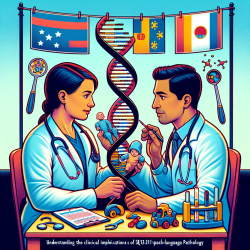Introduction
The 3q13.31 microdeletion is an emerging genomic disorder that has been linked to a variety of neurodevelopmental conditions, including speech impairments. As a speech-language pathologist, understanding the genetic underpinnings of such disorders can enhance clinical practice and improve patient outcomes. This blog post explores the findings from a recent study on the adult expression of a 3q13.31 microdeletion, offering insights into how these findings can be applied in speech-language pathology.
Key Findings from the Research
The study, titled Adult expression of a 3q13.31 microdeletion, highlights the extended adult phenotype associated with this genetic deletion. The researchers identified a 41-year-old male with schizophrenia and a nonverbal learning disability, who exhibited speech impairment and delayed motor skills. The deletion spans several genes, including GAP43 and LSAMP, which are implicated in neurodevelopmental disorders.
Importantly, the study underscores the role of rare copy number variations (CNVs) in later-onset conditions like schizophrenia. These findings suggest that detailed phenotypic information across the lifespan is crucial for accurate genetic counseling and anticipatory care.
Implications for Speech-Language Pathology
Understanding the genetic basis of speech and language disorders can significantly impact clinical practice. Here are some ways practitioners can leverage this research:
- Genetic Counseling: Speech-language pathologists can play a role in multidisciplinary teams by providing insights into the speech and language implications of genetic findings. This can aid in developing comprehensive care plans for individuals with 3q13.31 microdeletion.
- Targeted Interventions: Knowledge of specific genetic markers can guide the development of targeted interventions that address the unique needs of individuals with this microdeletion.
- Research and Development: Practitioners are encouraged to engage in further research to explore the genotype-phenotype correlations in speech and language disorders. This can contribute to the development of evidence-based practices.
Encouraging Further Research
The rarity of 3q13.31 microdeletion highlights the need for more research to fully understand its implications. Speech-language pathologists can contribute to this body of knowledge by documenting clinical cases and participating in genetic studies. Collaboration with geneticists and other healthcare professionals can lead to more comprehensive insights into the disorder.
Conclusion
The study of 3q13.31 microdeletion offers valuable insights into the genetic factors contributing to speech and language disorders. By integrating these findings into clinical practice, speech-language pathologists can enhance their ability to provide personalized care and improve outcomes for individuals with neurodevelopmental disorders. To read the original research paper, please follow this link: Adult expression of a 3q13.31 microdeletion.










